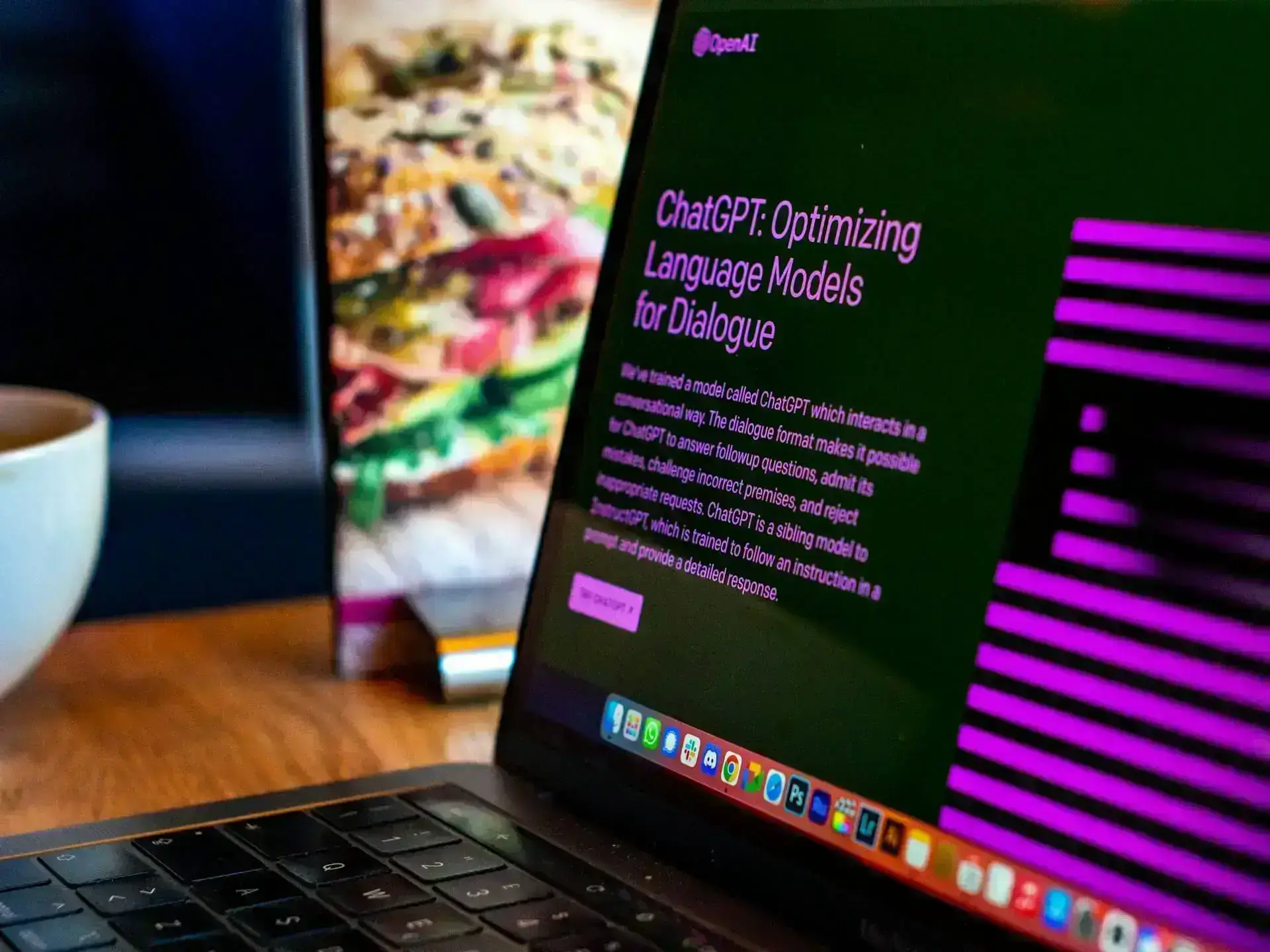Contact Us Today for a
Comprehensive Analysis and Strategy Session.
Ready to level up your online game? Call (844) 200-6112 or dive into the form below.
Embrace the future of collaboration with OmniFunnel's Oculus 2 VR headset offer for valued clients. It's your entry into immersive VR meetings in the metaverse, redefining digital meetings and shaping virtual collaboration in the realm of web3.
In an era where artificial intelligence (AI) not only complements but often surpasses human capabilities in specific tasks, Large Language Models (LLMs) stand out as beacons of innovation. The advent of these models has heralded a new age of efficiency and personalization for businesses across the globe. With 77% of consumers preferring brands that personalize experiences, integrating LLMs into business operations is no longer a luxury but a necessity. This article aims to unravel the Potential of LLMs, focusing on their significance in today's technology-driven market and the paramount importance of fine-tuning for bespoke business applications. Readers will gain insights into the transformative power of LLMs, incredibly when fine-tuned for specific purposes, drawing on key examples such as the collaboration between DeepLearning.AI and AWS. How can businesses leverage these advancements to stay ahead in the competitive landscape? Let's delve deep into the realm of LLMs and uncover the strategies that will empower enterprises to harness the full spectrum of AI capabilities.

Large Language Models (LLMs) have become the cornerstone of modern AI applications, offering unprecedented capabilities in understanding and generating human-like text. These models, trained on vast datasets of text from the internet, can comprehend context, answer questions, write content, and even code, marking a significant leap in AI's evolution. LLMs' utility spans various sectors, enhancing customer service automation, content creation, and even coding tasks, making them invaluable assets for businesses aiming to innovate and improve efficiency.
As we explore the landscape of LLMs and their application in business, it becomes clear that mastering large language model fine-tuning is not just an option but a necessity for companies aiming to leverage the full power of AI. This journey into the world of LLMs is just the beginning, with endless possibilities on the horizon for businesses ready to embrace the AI revolution.
Selecting the optimal Large Language Model (LLM) for your business involves more than picking the most popular option on the market. It requires a strategic evaluation of various factors to ensure the chosen LLM aligns perfectly with your business objectives. Here are essential criteria to consider:
By carefully considering these factors, business owners, entrepreneurs, and CEOs can make an informed decision when selecting an LLM. This strategic approach ensures that the LLM will meet the business's immediate needs and support long-term objectives, paving the way for sustainable growth and innovation.
Fine-tuning is a pivotal process for businesses looking to leverage large language models (LLMs) to their fullest Potential. This method involves adjusting a pre-trained model to suit specific tasks or datasets that are more relevant to your business. Here's a closer look at fine-tuning, highlighting its importance and benefits, especially in Parameter-Efficient fine-tuning (PEFT).
Step-by-Step Breakdown:
Turing.com underscores the significance of fine-tuning LLMs, especially for custom use cases. By fine-tuning, businesses can witness a marked improvement in model performance, ensuring that AI-driven solutions are efficient and highly tailored to address specific business needs.
Parameter-Efficient Fine-Tuning (PEFT) plays a crucial role here. PEFT allows for the fine-tuning of LLMs without the need for extensive computational resources. This approach benefits businesses, tiny to medium-sized enterprises that may have a limited amount of computational power at their disposal. The advantages of PEFT include:
The fine-tuning process, significantly when augmented by PEFT, offers a compelling pathway for businesses to harness the power of LLMs. It enhances the model's performance on business-specific datasets and optimizes resource use, making advanced AI solutions more accessible and practical for business applications across various industries.
Understanding the critical role of dataset size and quality in fine-tuning Large Language Models (LLMs) is paramount for any business venturing into AI-driven solutions. The guidance from naologic.com is a pivotal reference point, suggesting at least 1,000 examples per task as a foundational benchmark for effective fine-tuning. This figure isn't arbitrary but underscores the necessity for a sufficiently robust dataset to teach the model the nuanced variations within the task it aims to perform.
Why Emphasize Dataset Size and Quality?
Strategies for Dataset Collection and Preparation:
Avoiding Common Pitfalls:
In essence, the journey to mastering large language model fine-tuning begins with your dataset's meticulous assembly and preparation. For businesses, entrepreneurs, and CEOs looking to leverage the transformative power of AI, investing time and resources in building a comprehensive, clean, and diverse dataset represents a critical step toward achieving AI solutions that are innovative but also robust and reliable in their application. The emphasis on data requirements underscores that in AI, quality and quantity of data are not just operational concerns—they are strategic imperatives.

Mastering the art of fine-tuning Large Language Models (LLMs) demands a nuanced understanding of the available techniques and an adherence to best practices. The landscape is rich with opportunities and pitfalls for business owners, entrepreneurs, and CEOs looking to leverage LLMs for competitive advantage. The guide by Lakera.ai offers a comprehensive look into the methods you can use to fine-tune your models effectively. Here, we distill those insights into actionable strategies and cautionary tales.
Techniques for Fine-tuning LLMs:
Best Practices:
Conclusion:
For leaders at the helm of businesses looking to innovate through AI, mastering large language model fine-tuning is a journey of strategic importance. By selecting the proper fine-tuning techniques and adhering to established best practices, you equip your business with the tools to navigate the complexities of AI implementation. Remember, the goal is not just to fine-tune a model but to do so to align with your specific business needs and ethical considerations, ensuring that your LLM becomes a robust, reliable, and valuable asset in your digital strategy arsenal.
In the dynamic world of AI, the quest for models that understand and align with human values is paramount. For businesses, the stakes are even higher; the integrity of your AI's responses can significantly impact your brand's trustworthiness and customer satisfaction. This is where Reinforcement Learning From Human Feedback (RLHF) emerges as not just a technique but a cornerstone for fine-tuning Large Language Models (LLMs) to mirror human preferences accurately.
The Essence of RLHF
RLHF stands out by enabling LLMs to refine their outputs based on qualitative human feedback rather than solely relying on quantitative data points. This method is instrumental in fostering honest, harmless, and helpful model behaviors—traits crucial for customer-facing AI applications. The course on Coursera by DeepLearning.AI and AWS illuminates the transformative Potential of RLHF in aligning AI outputs with nuanced human expectations.
Critical Components of RLHF Implementation:
Why RLHF Matters for Businesses:
The strategic implementation of RLHF signifies a leap towards LLMs that are not just technologically advanced but also ethically aligned and customer-focused. For business leaders, embracing RLHF in fine-tuning LLMs is a step forward in harnessing the power of AI to foster deeper connections with their audience, ensuring their AI-driven solutions are both impactful and in harmony with human values.

Transitioning from the theoretical underpinnings of Large Language Models (LLMs) to their practical applications in business environments marks a significant leap toward digital transformation. This journey, while promising, demands meticulous planning and execution. As businesses venture into integrating fine-tuned LLMs, several vital areas emerge as critical for success.
Practical Aspects of Deployment
Expertise of Mudassir A. Amazon SageMaker Developer
The expertise of professionals like Mudassir A., renowned for their proficiency in deploying and managing LLM-based applications, is invaluable. Their deep understanding of platforms such as Amazon SageMaker gives businesses a competitive edge, allowing for the optimal utilization of LLMs. Mudassir's approach emphasizes:
Maintenance and Updating Considerations
In essence, integrating fine-tuned LLMs into business operations is a multifaceted endeavor that requires strategic planning, technological expertise, and ongoing management. By focusing on these key aspects, businesses can unlock LLMs' full Potential, driving innovation and achieving sustainable growth.
Evaluating the success of fine-tuning Large Language Models (LLMs) becomes a cornerstone for businesses aiming to leverage AI for a competitive advantage. The journey from deploying to deriving tangible business outcomes from LLMs necessitates a structured approach to measurement and analysis. Here, we delve into methods that underpin the strategic evaluation of LLM fine-tuning efforts, highlighting their impact on business KPIs and overall efficiency.
Key Performance Metrics
User Engagement Data
Business KPIs
Continuous Monitoring and Optimization
There are many examples of improved business outcomes post-LLM fine-tuning. Companies have reported enhanced customer interaction quality, leading to higher retention rates and increased sales. Others have seen reduced operational costs by automating repetitive tasks, freeing human resources for more strategic roles. The common thread across these successes is the emphasis on meticulous measurement and the commitment to continuous improvement.
By focusing on these methods for evaluating fine-tuning efforts, businesses can navigate the complexities of AI integration more effectively, ensuring that their investment in LLM technology translates into tangible business benefits. This strategic approach enhances current operations and lays a foundation for leveraging future advancements in AI technology.
The advent of Large Language Models (LLMs) heralds a new era in AI-driven solutions for businesses. However, with great power comes great responsibility, particularly in ensuring ethical use and mitigating biases. The moral implications of LLM fine-tuning are profound, extending beyond mere technical adjustments to encompass broader societal impacts. The Potential for perpetuating biases through these models necessitates a vigilant approach to their development and deployment.
AI's course on Training and Fine-tuning LLMs for Production offers valuable insights into navigating the complex landscape of LLM ethics, model collapse, and scaling laws. It serves as a crucial resource for business leaders striving to harness the power of LLMs responsibly. Here, we explore strategies to ensure ethical considerations remain at the forefront of LLM fine-tuning efforts:
The commitment to ethical AI use and bias mitigation in LLM fine-tuning is not just a regulatory or compliance issue. It is fundamental to building trust with users and leveraging AI technology to drive positive societal outcomes. Business owners, entrepreneurs, and CEOs must integrate these principles into their AI strategies, ensuring their innovations contribute to an equitable and ethical digital landscape.

The trajectory of Large Language Models (LLMs) and Generative AI is set to redefine the boundaries of technology, innovation, and business strategy. As we peer into the horizon, several pivotal trends emerge, promising to shape the future of AI and, by extension, the future of work and society.
As we stand at the cusp of this AI revolution, business leaders must stay informed and agile. The ability to adapt to and leverage these emerging trends in LLM fine-tuning and Generative AI will provide a competitive edge and shape a future where technology amplifies human Potential, drives sustainable growth, and fosters an inclusive digital society.

As a beacon of innovation, we guide your business through the evolving digital landscape with cutting-edge solutions.

Our steadfast reliability anchors your strategic endeavors, ensuring consistent delivery and performance.

We harness state-of-the-art technology to provide smart, scalable solutions for your digital challenges.

Our extensive experience in the digital domain translates into a rich tapestry of success for your brand.

Upholding the highest standards of digital security, we protect your business interests with unwavering vigilance.

We offer a stable platform in the tumultuous digital market, ensuring your brand's enduring presence and growth.
OmniFunnel Marketing has garnered notable recognition from a range of prestigious media outlets. This acknowledgment from leading publications not only underscores our expertise in the digital marketing realm but also highlights our commitment to delivering exceptional marketing strategies. Our presence in these prominent media sources is a testament to the trust and value we bring to our clients, elevating their marketing efforts to new heights.













As a beacon of innovation, we guide your business through the evolving digital landscape with cutting-edge solutions.

Our steadfast reliability anchors your strategic endeavors, ensuring consistent delivery and performance.

We harness state-of-the-art technology to provide smart, scalable solutions for your digital challenges.

Our extensive experience in the digital domain translates into a rich tapestry of success for your brand.

Upholding the highest standards of digital security, we protect your business interests with unwavering vigilance.

We offer a stable platform in the tumultuous digital market, ensuring your brand's enduring presence and growth.

Experienced Senior Teams
Profit-First Strategy & Consulting
Channel-Specific Paid Media
Tracking & Attribution Specialists
Conversion Rate Optimization (CRO)
In-House Developers
In-House Creative Production
Proprietary First-Party Data Priming
Full-Funnel Feedback Loops
AI Voice Agents & Automated
AI Content Engine
MCP + LLM Real-Time Optimization
Value-Based Bidding & ROI
Installed CMO Leadership
You Own All Assets







Our talented team brings 20+ years of expertise and passion.

Michael Tate, CEO and Co-Founder of OmniFunnel Marketing, is a pioneering leader in leveraging AI and machine learning (ML) technologies to revolutionize digital marketing. With over 20 years of expertise in new media sales, Michael has distinguished himself as an SEO/SEM specialist, adept at integrating AI-driven strategies to enhance paid performance marketing. Since January 2016, he has been instrumental in transforming OmniFunnel Marketing into a hub of innovation, particularly in the legal and medical sectors. His philosophy, “more visibility without more expenditure,” is brought to life through AI-powered marketing tools, offering small and medium-sized firms a competitive edge.
His role involves not just client engagement but also orchestrating AI and ML tools to optimize marketing strategies for ROI maximization. Michael's expertise in AI-driven data analysis and workflow automation enables businesses to achieve unprecedented productivity and efficiency, ensuring robust online presence and profitability.
.png)
Former foreign policy advisor turned digital marketing and communications consultant, Kalinda's extensive professional journey spans nearly two decades across both public and private sectors. Her expertise lies in strategic and creative marketing strategy, as well as communications management for businesses, associations, and government agencies. Having lived and worked globally, she has had the privilege of assisting businesses—both in the US and abroad—achieve their goals through impactful social media campaigns, community building, outreach, brand recognition, press relations, and corporate communication.
Kalinda's passion lies in cultivating meaningful relationships among stakeholders while building lasting digital brands. Her signature approach involves delving into each client’s unique needs and objectives from the outset, providing highly customized, bespoke service based on their needs. From political leaders to multi-unit restaurant concepts and multi-million dollar brands, Kalinda has successfully guided a diverse range of clients reach and exceed their digital marketing, public relations, and sales goals.

Emma Harris, Chief Operating Officer (COO) of OmniFunnel Marketing, Emma plays a pivotal role in steering the operational direction and strategy of the agency. Her responsibilities are multi-faceted, encompassing various aspects of the agency's operations.
Emma utilizes her extensive operational experience to lead and oversee the agency's day-to-day operations. She is responsible for developing and implementing operational strategies that align with the agency's long-term goals and objectives. Her strategic mindset enables her to foresee market trends and adapt operational strategies accordingly, ensuring the agency remains agile and competitive.

Sarah Martinez, as the Marketing Manager at OmniFunnel Marketing, holds a crucial role in shaping and executing the marketing strategies of the agency. Her responsibilities are diverse and impactful, directly influencing the brand's growth and presence in the market.
Sarah is responsible for crafting and overseeing the execution of marketing campaigns. This involves understanding the agency's objectives, identifying target audiences, and developing strategies that effectively communicate the brand's message. She ensures that each campaign is innovative, aligns with the agency's goals, and resonates with the intended audience.

Joseph Pagan, OmniFunnel Marketing's Director of Design & Development, is a visionary in integrating AI and ML into creative design and web development. His belief in the synergy of UI/UX, coding, and AI technologies has been pivotal in advancing OmniFunnel's design and development frontiers. Joseph has led his department in leveraging AI and workflow automation to create websites that are not only aesthetically pleasing but highly functional and intuitive
His approach involves using advanced AI tools to streamline web development processes, ensuring adherence to top-notch coding standards and design guidelines. This leads to enhanced efficiency, accuracy, and client satisfaction. Joseph's extensive experience across different design and development domains, combined with his proficiency in AI and ML, empowers OmniFunnel Marketing to deliver cutting-edge, user-centric digital solutions that drive business growth and customer engagement.

Camila is a pioneering digital marketing leader who began shaping influencer strategy before it became an industry standard, partnering with mega brands like H&M, Universal Music, FabFitFun, FoxyBae, and Amika just to name a few. An early adopter and entrepreneur, she evolved from affiliate manager to blogger to 7-figure eCommerce brand founder and later accelerated growth for an innovative Silicon Valley software startup redefining personal health data ownership and user empowerment.
She’s played a pivotal role in educating leading global agencies like Starcom, and Ogilvy, Universal McCann—on the power of influencer marketing in its formative years. With expertise in customer acquisition, scalable strategy, and trend forecasting, Camila bridges the gap between people and brands—aligning KPIs with market realities while delivering measurable growth. She remains at the forefront of digital innovation, integrating the power of AI with human insight to fuel growth, relevance, and long-term brand value.
Discover Success Stories from OmniFunnel's Diverse Portfolio.
Dive into the narratives of our clients who have embraced OmniFunnel's AI-driven marketing solutions to monumental success. Their experiences underscore our commitment to harnessing artificial intelligence for strategic marketing that not only reaches but resonates with target audiences, fostering robust engagement and exceptional growth.
Kevin Stranahan
Jane Martinez
David Butler
Discover Success Stories from OmniFunnel's Diverse Portfolio.
Dive into the narratives of our clients who have embraced OmniFunnel's AI-driven marketing solutions to monumental success. Their experiences underscore our commitment to harnessing artificial intelligence for strategic marketing that not only reaches but resonates with target audiences, fostering robust engagement and exceptional growth.
"OFM's expertise in eCommerce marketing is unparalleled. They optimized our PPC campaigns, revamping our ad spend to yield an astounding ROI. If you're looking to make waves in the digital world, look no further than OFM."
Kevin Stranahan
"Transparency and innovation are at the core of OFM’s services. Their monthly reports are comprehensive, and their readiness to adapt and innovate is remarkable. We've finally found a digital marketing agency we can trust for the long haul."
Jane Martinez
"OmniFunnel's AI solutions have exceeded our expectations and delivered outstanding results."
David Butler
Discover Success Stories from OmniFunnel's Diverse Portfolio.
Dive into the narratives of our clients who have embraced OmniFunnel's AI-driven marketing solutions to monumental success. Their experiences underscore our commitment to harnessing artificial intelligence for strategic marketing that not only reaches but resonates with target audiences, fostering robust engagement and exceptional growth.
"OFM's expertise in eCommerce marketing is unparalleled. They optimized our PPC campaigns, revamping our ad spend to yield an astounding ROI. If you're looking to make waves in the digital world, look no further than OFM."
Kevin Stranahan
"Transparency and innovation are at the core of OFM’s services. Their monthly reports are comprehensive, and their readiness to adapt and innovate is remarkable. We've finally found a digital marketing agency we can trust for the long haul."
Jane Martinez
"OmniFunnel's AI solutions have exceeded our expectations and delivered outstanding results."
David Butler
At OmniFunnel Marketing, we pride ourselves on being a beacon of innovation and excellence in the digital marketing world. As an award-winning agency, we are celebrated for our pioneering strategies and creative ingenuity across the digital landscape. Our expertise is not confined to a single aspect of digital marketing; rather, it encompasses a full spectrum of services, from SEO and PPC to social media and content marketing. Each campaign we undertake is an opportunity to demonstrate our skill in driving transformative results, making us a trusted partner for businesses seeking to navigate and excel in the complex digital arena. Our holistic approach ensures that every facet of digital marketing is leveraged to elevate your brand, engage your audience, and achieve outstanding growth and success
Ready to level up your online game? Call (844) 200-6112 or dive into the form below.